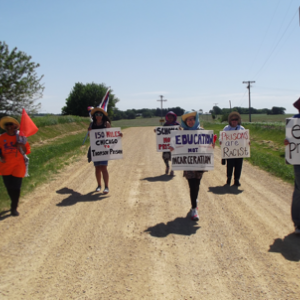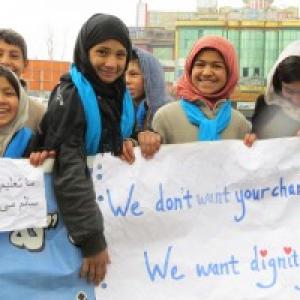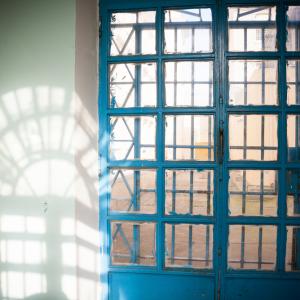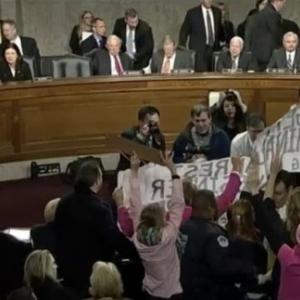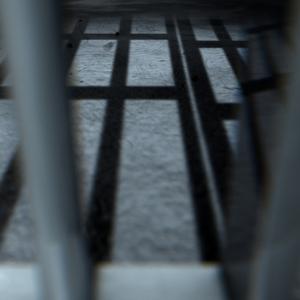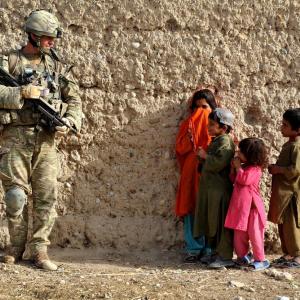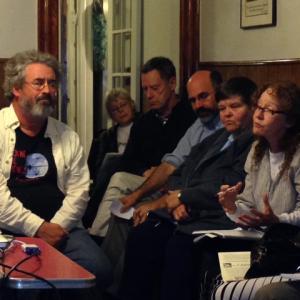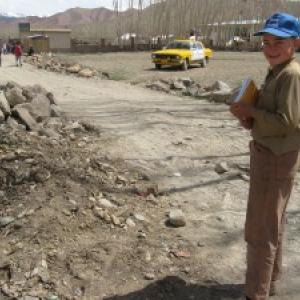Kathy Kelly (kathy@vcnv.org) co-coordinates Voices for Creative Nonviolence (www.vcnv.org)
Posts By This Author
The Fabric of Peace
How Afghan Peace Volunteers Risk Their Lives to Build Community
Without any input from the centralized government, the Afghan Peace Volunteers build community and share resources. Within Kabul, they arrange inter-ethnic activities and projects, distribute food, educate children, and manufacture heavy blankets to help families survive the harsh winters. They risk their lives to relate with people whom they are told are their enemies.
Eternal Hostility: A New Year’s Resolution
It was a year of social service program shutdowns driven by the governor’s office in Springfield. The Rev. Dr. Martin Luther King’s description of a triplet of giant evils, each insoluble in isolation from the others, helps us identify an answer to the Tribune’s question. King spoke of the giant triplets of racism, extreme materialism, and militarism. Training for, and the diversion of money to, wars overseas was a crisis inextricable from the race crisis at home, as were policies promoting radical wealth inequality. Rep. Danny Davis of Chicago, whose grandson was killed by gun violence in 2016, insists that “poverty was fueling the city’s bloodshed, and that Chicago needed to make investments ‘to revamp whole communities.’
America's Policing Problem Is Global
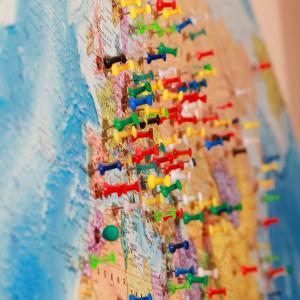
Image via O M/Shutterstock.com
Which has ever brought a peaceful future nearer to neighborhoods: weaponized military and surveillance systems, or the efforts of concerned neighbors seeking justice? The United States withholds resources needed for the task of healing the battle scars our country has inflicted on so much of the world. If our fear is endless, how will these wars ever end?
The Cold War Might Not Be Over — and the US Is Making It Worse

Image via Zack Frank / Shutterstock.com
In the historic port city of Yalta, located on the Crimean Peninsula, I visited the site where Churchill, Roosevelt, and Stalin, in February of 1945, concluded negotiations ending World War II.
These leaders and their top advisers were also present at the creation of the United Nations and other instruments of international negotiation and non-military cooperation. Tragically, the creation of the “Cold War” was underway soon after.
De-Incarceration: A Different Drum So Needed
The solution to our awful prison problem is contained in the story of Gov. Edgar, Ratliff, and Celestial Ministries: Make a preferential option for those who are most impoverished in our midst. We might fund these efforts by taking money away from the corporations promoting criminal attacks on innocent people in other lands.
Building Trust Takes Resources, Not Drones

Image via cagkan yuksel/Shutterstock.com
Glancing upward at one of the six U.S.-manufactured aerostat blimps performing constant surveillance over Kabul, I wonder if the expensive, high-tech, giant’s-eye view encourages a primitive notion that the best way to solve a problem here is to target a “bad guy” and then kill him. If the bad guys appear to be scurrying dots on the ground below, stomp them out. But crushing only the right dots has proven very difficult for a U.S. drone warfare program documented to have killed many civilians.
Hammering for Peace

Image via MIGUEL GARCIA SAAVEDRA/Shutterstock.com
I wish that the testimony of my friends who literally beat guns into garden tools could be part of the courtroom proceeding. They urge us to make guns and other weapons unnecessary, using raw tools of compassion and service to heal the conflicts in which weapons are used. I wish my young Afghan friends here in Kabul, who live under constant surveillance of Unmanned Aerial Systems, could testify about their desire to refine tools of peace making and constructive service.
Surveillance and Surveys in Kabul
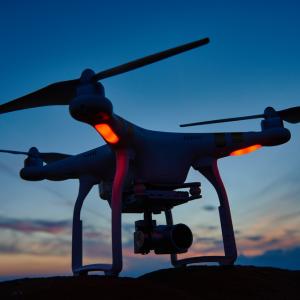
Surveillance drone, Dmitry Kalinovsky / Shutterstock.com
In Kabul, where the Afghan Peace Volunteers have hosted me in their community, the U.S. military maintains a huge blimp equipped with cameras and computers to supply 24-hour surveillance of the city. Remotely piloted drones, operated by Air Force and Air National Guard personnel in U.S. bases, also fly over Afghanistan, feeding U.S. military analysts miles of camera footage every day. Billions of dollars have been invested in a variety of blimps, which various vendors, such as Raytheon, Lockheed Martin, Northrup Grumman, and Aeros have shipped to Afghanistan. All of this surveillance purportedly helps establish “patterns of life” in Afghanistan and bring security to people living here. But this sort of “intelligence” discloses very little about experiences of poverty, chaos, hunger, child labor, homelessness, and unemployment that afflict families across Afghanistan.
One Afghan Teenager Says 'Enough!' to the Taliban — and the U.S.
Tall, lanky, cheerful, and confident, Esmatullah easily engages his young students at the Street Kids School, a project of Kabul’s Afghan Peace Volunteers, an antiwar community with a focus on service to the poor. Esmatullah teaches child laborers to read. He feels particularly motivated to teach at the Street Kids School because, as he puts it, “I was once one of these children.”
Esmatullah began working to support his family when he was 9 years old. Now, at age 18, he is catching up on school.He has reached the tenth grade, takes pride in having learned English well enough to teach a course in a local academy, and knows that his family appreciates his dedicated, hard work.
When Esmatullah was nine, the Taliban came to his house looking for his older brother. Esmatullah’s father wouldn’t divulge information they wanted. The Taliban then tortured his father by beating his feet so severely that he has never walked since. Esmatullah’s dad, now 48, has never learned to read or write. There are no jobs for him.
Let It Shine

Image via Galyna Andrushko/Shutterstock
In the face of wars, refugee crises, weapon proliferation, and unaddressed climate change impacts, let us echo the common sense of children. Let goodness shine.
Or, as our young friends in Afghanistan have put it, #Enough! They write the word, in Dari, on the palms of their hands and show it to cameras, wanting to shout out their desire to abolish all wars.
This past summer, collaborating with Wisconsin activists, we decided to feature this refrain on signs and announcements for a 90-mile walk campaigning to end targeted drone assassinations abroad, and the similarly racist impunity granted to an increasingly militarized police force when they kill brown and black people within the U.S.
Building Toward a New Dawn in Afghanistan

Image via skyearth/Shutterstock
On this fast day, I remember that many U.S. people worry — like anyone anywhere — about the hardships a new day may bring, in a dangerous and uncertain time that seems to be dawning on every nation and the species as a whole. In the U.S., we carry the added knowledge that most of the world lives much more poorly — in a material sense, at least — than we do, and that were the sun to truly rise upon the U.S., with familiar words of equality and justice truly realized, we would have to share much of our wealth with a suffering world.
We would learn to "live simply so that others might simply live." We would find deep satisfaction in beholding faces like those of my friends gathered for a friendly morning meal before a day of voluntary fasting. Or, like Mohamedou, we would find warmth in the imagined breath of others sharing involuntary hardships.
"Another world is not only possible," writes author and activist Arundhati Roy, "she is on her way. On a quiet day, I can hear her breathing."
People living in the U.S. must know that life in the daylight might also be the start of an unaccustomed fast.
Fear and Learning in Kabul
Essentially, when Voices members go to Kabul, our “work” is to listen to and learn from our hosts and take back their stories of war to the relatively peaceful lands whose actions had brought that war down upon them. Before we'd even departed, the news from Afghanistan was already quite grim. Several dozen people were dead in fighting between armed groups. There was a Kabul hotel attack on international businessmen the week before. We earnestly wrote our friends with a last-minute offer to stay away, in hopes that we wouldn't make them targets of the violence. “Please come,” our friends wrote us. So we're here.
Possibility of Escape
That is also us, the possibility of us, if the wonderful accident of our birth had taken place elsewhere: you could be the refugee, I could be the torturer. To face that truth is also our burden. After all, each of us has been the bystander, the reasonable person who just happens not to hear, not to speak, not to see those people, the invisible ones, those who live on the other side of the border. - Karen Connelly, The Lizard Cage
It was a little over two weeks ago that Marlo entered Atwood Hall here in Lexington federal prison. Nearly all the women here are nonviolent offenders. When I first saw Marlo, her eyes seemed glued to the tiled floors as she shuffled along hallways. I guessed her age to be 25 or so. A few days later, she came to a choir rehearsal. She was still shy, but she looked up and offered a quiet smile when she joined the soprano section. The next time our choir gathered, Marlo raised her hand before we ended our rehearsal. "I got something to say," she said, as she stood. "When I first came here, I can tell all of you now, I was terrified. Just plain terrified. I have 70 months, and I felt so scared." The intake process for this, her introduction to the prison system, had badly frightened her, but before sundown that same day, a second intake process had occurred, with several inmates finding her, reassuring her, and getting her beyond that first panic.
During my four stints in U.S. federal prisons, I've witnessed long-term inmates' unconquerably humane response when a newcomer arrives. An unscripted choreography occurs, and the new prisoner finds that other women will help her through the trauma of adjustment to being locked up for many months or years. Halfway through a 3-month sentence myself, I'm saddened to realize that I'll very likely adapt to an outside world for which these women, and prisoners throughout the U.S. prison system, are often completely invisible.
The Front Page Rule
After a week here in FMC Lexington Satellite camp, a federal prison in Kentucky, I started catching up on national and international news via back issues of USA Today available in the prison library. An "In Brief" item, on p. 2A of the Jan. 30 weekend edition, caught my eye. It briefly described a protest in Washington, D.C., in which members of the antiwar group "Code Pink" interrupted a U.S. Senate Armed Services budget hearing chaired by Sen. John McCain (R-Ariz.). The protesters approached a witness table where Henry Kissinger, Madeleine Albright, and George Schulz were seated. One of their signs called Henry Kissinger a war criminal. "McCain," the article continued, "blurted out, 'Get out of here, you low-life scum.'"
At mail call, a week ago, I received Richard Clarke's novel, The Sting of the Drone, about characters involved in developing and launching drone attacks. I'm in prison for protesting drone warfare, so a kind friend ordered it for me. The author, a former "National Coordinator for Security and Counterterrorism," worked for 30 years inside the U.S. government but seems to have greater respect than some within government for concerned people outside of it. He seems also to feel some respect for people outside our borders.
He develops, I think, a fair-minded approach toward evaluating drone warfare given his acceptance that wars and assassinations are sometimes necessary. (I don't share that premise). Several characters in the novel, including members of a House Permanent Select Committee on Intelligence, criticize drone warfare, noting that in spite of high level, expensive reconnaissance, drone attacks still kill civilians, alienating people the U.S. ostensibly wants to turn away from terrorism.
A Future in Prison
The Bureau of Prisons contacted me today, assigning me a prison number and a new address: for the next 90 days, beginning tomorrow, I’ll live at FMC Lexington, in the satellite prison camp for women, adjacent to Lexington’s federal medical center for men. Very early tomorrow morning, Buddy Bell, Cassandra Dixon, and Paco and Silver, two house guests whom we first met in protests on South Korea’s Jeju Island, will travel with me to Kentucky and deliver me to the satellite women’s prison outside the Federal Medical Center for men.
In December 2014, Judge Matt Whitworth sentenced me to three months in federal prison after Georgia Walker and I had attempted to deliver a loaf of bread and a letter to the commander of Whiteman Air Force base, asking him to stop his troops from piloting lethal drone flights over Afghanistan from within the base. Judge Whitworth allowed me more than a month to surrender myself to prison; but whether you are a soldier or a civilian, a target or an unlucky bystander, you can’t surrender to a drone.
When I was imprisoned at Lexington prison in 1988, after a federal magistrate in Missouri sentenced me to one year for planting corn on nuclear missile silo sites, other women prisoners playfully nicknamed me “Missiles.” One of my sisters reliably made me laugh today, texting me to ask if I thought the women this time would call me “Drones.”
It’s good to laugh and feel camaraderie before heading into prison. For someone like me, very nearly saturated in “white privilege” through much of this arrest, trial, and sentencing process, 90 percent (or more) of my experience will likely depend on attitude.
Obama Extends U.S. Combat Role in Afghanistan
News agencies reported Saturday morning that weeks ago President Obama signed an order, kept secret until now, to authorize continuation of U.S. military operations in Afghanistan for at least another year. The order authorizes U.S. airstrikes “to support Afghan military operations in the country” and U.S. ground troops to continue normal operations, which is to say, to “occasionally accompany Afghan troops” on operations against the Taliban.
The administration, in its leak to the New York Times, affirmed that there had been “heated debate” between Pentagon advisers and others in Obama’s cabinet chiefly concerned not to lose soldiers in combat. Oil strategy isn't mentioned as having been debated and neither is further encirclement of China, but the most notable absence in the reporting was any mention of cabinet members’ concern for Afghan civilians affected by air strikes and ground troop operations, in a country already afflicted by nightmares of poverty and social breakdown.
While the concern for civilians may have been discussed even if not reported, it’s worth pointing out some of the suffering people on the ground continue to experience. Here are just three events, excerpted from an August 2014 Amnesty International report, which President Obama and his advisors should ha considered (and allowed into a public debate) before once more expanding the U.S. combat role in Afghanistan:
Challenging Drone Warfare in a U.S. Court
On Oct. 7, Georgia Walker and I appeared before Judge Matt Whitworth in a Jefferson City, Mo., federal court on a charge of criminal trespass to a military facility. The charge was based on our participation in a June 1 rally at Whiteman Airforce Base protesting drone warfare. Walker and I attempted to deliver a loaf of bread and a letter to the base commander, encouraging the commander to stop cooperating with any further usage of unmanned aerial vehicles, (drones) for surveillance and attacks.
The prosecutor, USAF Captain Daniel Saunders, said that if we would plead guilty to the charge, he would seek a punishment of one month in prison and a $500 fine. We told the prosecutor we could accept a “no contest” plea but were not willing to plead guilty. The prosecutor then said he would recommend a three-month prison sentence and a $500 fine. The judge refused to accept a “no contest” plea. We then requested a trial, which has been set for Dec. 10.
A Teacher in Kabul
Here in Kabul, one of my finest friends is Zekerullah, who has gone back to school in the eighth grade although he is an 18-year old young man who has already had to learn far too many of life’s harsh lessons.
Years ago and miles from here, when he was a child in the province of Bamiyan, and before he ran away from school, Zekerullah led a double life, earning income for his family each night as a construction crew laborer, and then attempting to attend school in the daytime. In between these tasks, the need to provide his family with fuel would sometimes drive him on six-hour treks up the mountainside, leading a donkey on which to load bags of scrub brush and twigs for the trip back down. His greatest childhood fear was of that donkey taking one disastrous wrong step with its load on the difficult mountainside.
And then, after reaching home weary and sleep deprived and with no chance of doing homework, he would, at times, go to school without having done his homework, knowing that he would certainly be beaten. When he was in seventh grade, his teacher punished him by adding 10 more blows each day he came to school without his homework, so that eventually he was hit 60 times in one day. Dreading the next day when the number would rise to 70, he ran away from that school and never returned.
Now Zekerullah is enrolled in another school, this time in Kabul, where teachers still beat the students. But Zekerullah can now claim to have learned much more, in some cases, than his teachers.
Borderfree
During a recent visit to Kabul’s Emergency Surgical Center for Victims of War, the staff shared with us their sense of what's happening around the country, derived from the reports of staff working at several dozen clinics and at their main hospitals in two other provinces. They described Kabul as "a bubble." They told us full-scale wars are being fought between quite heavily armed forces in both eastern and southern Afghanistan, although the news coverage that goes beyond Afghanistan generally pertains to Kabul. The groups fighting the Afghan government include various warlords, the Taliban, drug kingpins, and foreign fighters, some of whom may be strategizing ways to cut off the roads to Kabul. The Kabul “bubble” can be quite vulnerable.
The borders now vanishing in the Middle East – the most radical transformations of the map here since the post-WWI Sykes Picot agreement – are being redrawn in chaos and fear. The bubbles that burst here are the hopes for peace in a world avid for control of this region and its resources. Unfortunately, durable structures of separation and domination make it difficult for many young Afghans to fulfill their longings to connect meaningfully, peacefully, and stably with a saner world united under one blue sky.
Jobless Kabul and the Works of War
Last week, here in Kabul, the Afghan Peace Volunteers welcomed activist Carmen Trotta, from New York, who has lived in close community with impoverished people in his city for the past 25 years, serving meals, sharing housing, and offering hospitality to the best of his ability. Put simply and in its own words, his community, founded by Dorothy Day, exists to practice “the works of mercy” and to “end the works of war.” We wanted to hear Carmen’s first impressions of traveling the streets of Kabul on his way from the airport to the working class neighborhood where he’ll be staying as the APVs’ welcome guest.
He said it was the first time he’d seen the streets of any city so crowded with people who have no work.
Carmen had noticed men sitting in wheelbarrows, on curb sides, and along sidewalks, unemployed, some of them waiting for a day labor opportunity that might or might not come. Dr. Hakim, the APV’s mentor, quoted Carmen the relevant statistics: the CIA World Fact Book uses research from 2008 to put Afghanistan’s unemployment rate at 35 percent — just under the figure of 36 percent of Afghans living beneath the poverty level. That’s the CIA’s unemployment figure. Catherine James, writing in The Asian Review this past March, noted that “the Afghan Chamber of Commerce puts it at 40%, the World Bank measures it at 56% and Afghanistan’s labor leaders put it at a shocking 86%.”


